Analyzing manifestos is becoming a theme at this blog. Click here for Chris Dorner’s manifesto and here for the Unabomber manifesto.
Manifestos are interesting because they are the most deliberately written and deliberately personal of genres. It’s tenuous to make claims about a person’s psyche based on the linguistic features of his personal emails; it’s far less tenuous to make claims about a person’s psyche based on the linguistic features of his manifesto—especially one written right before he goes on a kill rampage. This one—”My Twisted World,” written by omega male Elliot Rodger—is 140 pages long, and is part manifesto, part autobiography.
I’ve made a lot of text networks over the years—of manifestos, of novels, of poems. Never before have I seen such a long text exhibit this kind of stark, binary division:
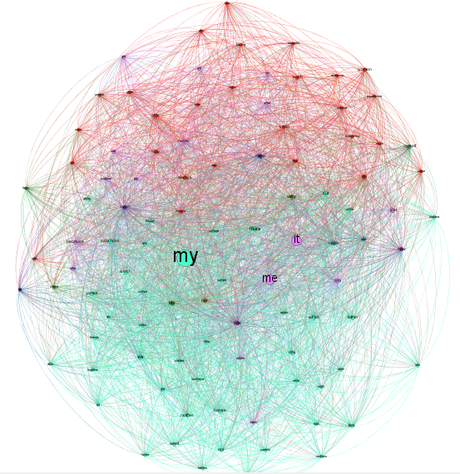
This network visualizes the nodes with the highest betweenness centrality. The lower, light blue cluster is Elliot’s domestic language; this is where you’ll find words like “friends”, “school,” “house,” et cetera . . . words describing his life in general. The higher, red cluster is Elliot’s sexually frustrated language; this is where you’ll find words like “girls,” “women,” “sex,” “experience,” “beautiful,” “never” . . . words describing his relationships with (or lack thereof) the feminine half of our species.
It’s quite startling. Although this text is part manifesto and part autobiography, I wasn’t expecting such a clear division: the language Elliot uses to describe his sexually frustrated life is almost wholly severed from the language he uses to describe his life apart from the sex and the “girls” (Elliot uses “girls” far more frequently than he uses “women”—see below). It’s as though Elliot had completely compartmentalized his sexual frustration, and was keeping it at bay. Or trying to. I don’t know how this plays out in individual sections of the manifesto. Nor do I know what it says about Elliot’s mental health more generally. I’ve always believed that compartmentalizing frustrations is, contra popular advice, a rather healthy thing to do. I expected a very, very tortuous and conflicted network to emerge here, indicating that each aspect of Elliot’s life was dripping with sexual angst and misogyny. Not so, it turns out.
Here’s a brief “zoom” on each section:
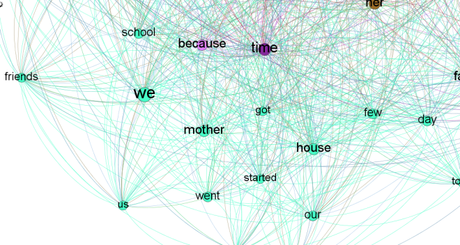
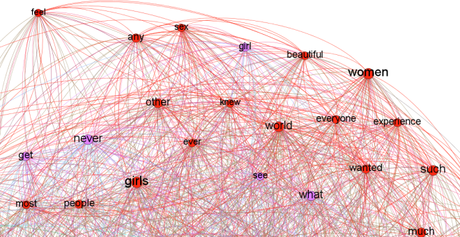
In the large, zoomed-out network—the first one in the post—notice that the most central nodes are “me” and “my.” I processed the text using AutoMap but decided to retain the pronouns, curious how the feminine, masculine, and personal pronouns would play out in the networks and the dispersion plots. Feminine, masculine, personal—not just pronouns in this particular text. And what emerges when the pronouns are retained is an obvious image of the Personal. Rodgers’ manifesto is brimming with self-reference:
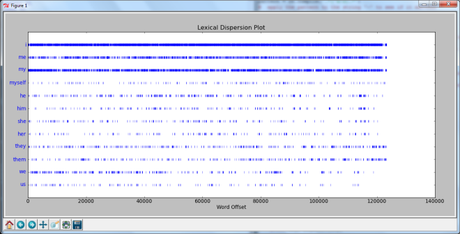
Take that with a grain of salt, of course. In making claims about any text with these methods, one should compare features with the features of general text corpora and with texts of a similar type. The Brown Corpus provides some perspective: “It” is the most frequent pronoun in that corpus; “I” is second; “me” is far down the list, past the third-person pronouns.
Here’s another narcissistic twist, found in the most frequent words in the text. Again, pronouns have been retained. (Click to enlarge.)
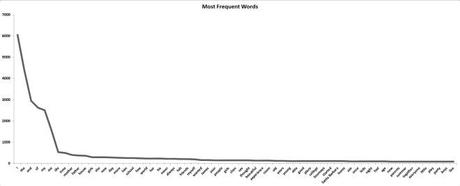
“I” is the most frequent word in the entire text, coming before even the basic functional workhorses of the English language. The Brown Corpus once more provides perspective: “I” is the 11th most frequent word in that general corpus. Of course, as noted, there is an auto-biographic ethos to this manifesto, so it would be worth checking whether or not other auto-biographies bump “I” to the number one spot. Perhaps. But I would be surprised if “I,” “me,” and “my” all clustered in the top 10 in a typical auto-biography—a narcissistic genre by design, yet I imagine that self-aware authors attempt to balance the “I” with a pro-social dose of “thou.” Maybe I’m wrong. It would be worth checking.
More lexical dispersion plots . . .
Much more negation is seen below then is typically found in texts. According to Michael Halliday, most text corpora will exhibit 10% negative polarity and 90% positive polarity. Elliot’s manifesto, however, bursts with negation. Also notice, below, the constant references to “mother” and “father”—his parents are central characters. But not “mom” and “dad.” I’m from Southern California, born and raised, with social experience across the races and classes, but I’ve never heard a single English-only speaker refer to parents as “mother” and “father” instead of “mom” and “dad.” Was Elliot bilingual? Finally, note that Elliot prefers “girl/s” to “woman/en.”
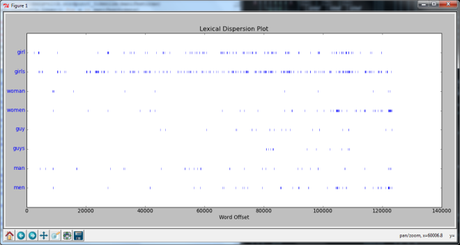
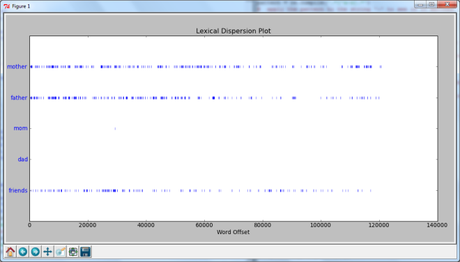
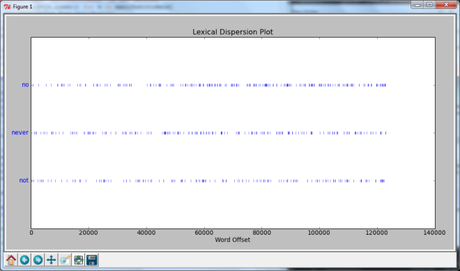
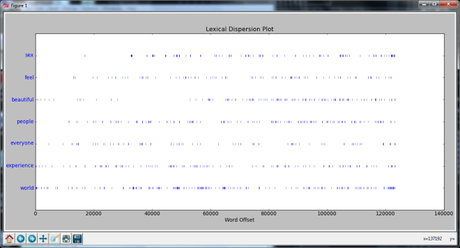
Until I discover that auto-biographical texts always drip with personal pronouns, I will argue that Elliot’s manifesto is the product of a narcissistic personality. The boy couldn’t go two sentences without referencing himself in some way.
And what about the misogyny? He uses masculine pronouns as often as he uses feminine pronouns; he refers to his father as often as he refers to his mother—although, it is true, the references to mother become more frequent, relative to father, as Elliot pushes toward his misogynistic climax. Overall, however, the rhetorical energy in the text is not expended on females in particular. This is not an anti-woman screed from beginning to end. Also, recall, the preferred term is “girls,” not “women.” Elliot hated girls. Women—middle-aged, old, married, ensconced in careers, not apt to wear bikinis on the Santa Barbara beach—are hardly on Elliot’s radar. (This ageism also comes through in his YouTube videos.) Despite the “I hate all women” rhetorical flourishes at the very beginning and the very end of his manifesto, Elliot prefers to write about girls—young, blonde, unmarried, pre-career, in sororities, apt to wear bikinis on the Santa Barbara beach.
I noticed something similar in the Unabomber manifesto. Not about the girls. About the beginning and ending: what we remember most from that manifesto is its anti-PC bookends, even though the bulk of the manifesto devotes itself to very different subject matter. The quotes pulled from manifestos (including this one) and published by news outlets are a few subjective anecdotes, not the totality of the text .
Anyway. Pieces of writing that sally forth from such diseased individuals always call to mind what Kenneth Burke said about Mein Kampf:
[Hitler] was helpful enough to put his cards face up on the table, that we might examine his hands. Let us, then, for God’s sake, examine them.
